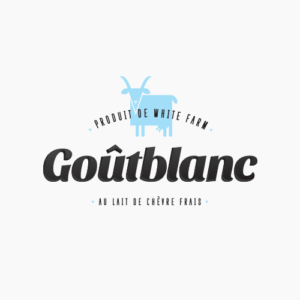A Lebanese company that manufactures and markets products made from goat’s milk under the brand name “Goûtblanc”. Located in Annaya at 1000 meters above sea level, our modern farm includes 840 goats of European breeds, Alpine and Saanen. The dairy occupying an area of 1000m2, is designed in accordance with French standards AFNOR that guarantee the quality of our products.
DID YOU KNOW?
You can have Lebanese produced French style goat cheese?
WHAT’S THE INNOVATION?
Gout Blanc introduced two types of European goat breeds into Lebanon: the Saanen and the Alpine.
These types of goats give 1,000 liters of milk per lactation and produce milk for ten months of the year; they only rest for the last two months of their pregnancy. So what Gout Blanc did is separate the goats into main groups and control their breeding so when one group is pregnant the other is producing milk and vice versa.
Through this way Gout Blanc had yearlong access to fresh goats’ milk and so could produce fresh goat dairy products such as spreadable labneh (they were the first to introduce it to Lebanon) and halloum. They were also the first to produce French goat cheese in Lebanon.
Gout Blanch started with 60 goats in 2006 and through trial and error in learning how to take care of them, today they are at 1,250 goats with the aim of reaching 3,000 goats soon.
WHAT’S THE STORY BEHIND THE INNOVATION?
Gout Blanc wanted to produce large quantities of fresh goat dairy products throughout the year. Although the local Baladi goats are strong and produce high quality milk, its production is limited to 120 liters per lactation and they only give milk 150 days of the year from May and until September- so they were not conducive to Gout Blanc’s goal.
To resolve this challenge, Gout Blanc introduced Alpine and Saanen breeds of European goats into Lebanon.
WHY IS IT IMPORTANT?
Goat dairy products are healthier than their cow counterparts. They are easier to digest and are higher in vitamin, calcium and phosphorous. Goat protein and fat content and composition are different from those of cows and as such those with an intolerance to dairy from cows milk would find a good alternative in goat dairy products- and there are many such cases in the Middle East.
When it comes to French style goat cheese, having a locally produced version with no additives or preservatives and which can reach the consumer within three days of its production is healthier and more time efficient (especially for the hospitality business).
WHO IS BENIFITTING?
Consumers are getting fresh goat dairy products all year long.



